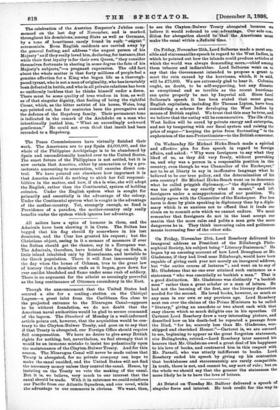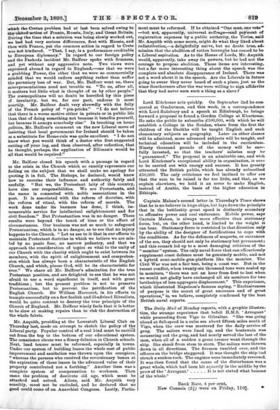At Bristol on Tuesday Mr. Balfour delivered a speech of
singular force and interest. He took credit for the way in which the Cretan problem had at last been solved owing to akenthited)sction of France, Russia, Italy, and Great Britain. During the time that a solution was being slowly worked out, we had had very serious differences, first with rc nags, and then with France, yet the common action in regard to Crete was not hindered. " That, I say, is a performance creditable to European diplomacy." In regard to our foreign policy and the Fashoda incident Mr. Balfour spoke with firmness, and yet without any aggressive note. Two views were expressed abroad in regard to England,—one that we were a, grabbing Power, the other that we were so commercially minded that we would endure anything rather than suffer the pecuniary loss of war. But, Mr. Balfour went on, these misrepresentations need not trouble us. " To us, after all, it matters but little what is thought of us by other people." The cosmopolitans will no doubt be horrified by this piece g insularity, but we, for our part, endorse it most heartily. Mr. Balfour dealt very shrewdly with the folly of the French policy of " pin-pricks." "I do not believe that there is a worse motive either in private or in public life than that of doing something not because it benefits yourself, but because it annoys somebody else." In touching on home politics, Mr. Balfour's comment on the new Liberal move of insisting that local government for Ireland should be taken as a substitute for Home-rule was quite excellent. " I do not know what you would think of a doctor who first suggested cutting off your leg, and then observed, after reflection, that he thought, perhaps, the application of Elliman's would be all that would be required."























































 Previous page
Previous page